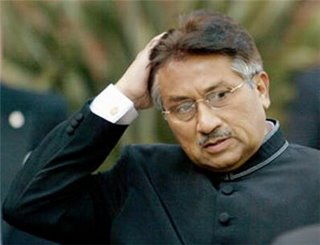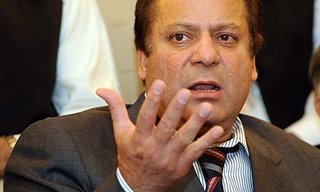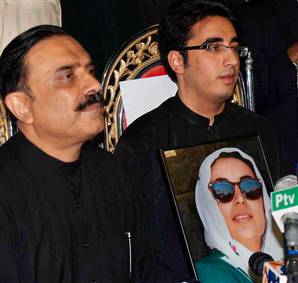 Recall that the members of the Supreme Court posed an untenable challenge to his de facto dictatorship when they thwarted his attempt to sack the chief justice.
Recall that the members of the Supreme Court posed an untenable challenge to his de facto dictatorship when they thwarted his attempt to sack the chief justice.
They then exacerbated Musharraf’s ire when they ruled that he had no legal authority to summarily deport his political arch-enemy, former prime minister Nawaz Sharif, when Sharif attempted to end his seven-year exile to run against Musharraf for president.
And when he got word (reportedly by having his secret police tap the phone of the chief justice) that the court was poised to rule his October 6 re-election null and void, he sacked most of them and imposed martial law, during which he had many of the lawyers marching today arrested.
But the writing was on the wall for Musharraf even before the Pakistan People’s Party (PPP), once headed by the assassinated former prime minister Benazir Bhutto but now headed by her widower, Asif Zardari, and the Pakistan Muslim League (PML-N), headed by Sharif, defeated his “king’s party” (PML-Q) resoundingly in parliamentary elections last February.
And this, notwithstanding my prediction that Musharraf would probably survive the coalition between Zardari and Sharif because they would soon discover that they hate each other even more than they hate him.
 Sure enough, within weeks of forming a fragile coalition government, Sharif pulled his ministers from the cabinet. Ironically, their irreconcilable differences erupted over the fact that Sharif wanted to reinstate, by executive order, the 45 senior judges Musharraf sacked.
Sure enough, within weeks of forming a fragile coalition government, Sharif pulled his ministers from the cabinet. Ironically, their irreconcilable differences erupted over the fact that Sharif wanted to reinstate, by executive order, the 45 senior judges Musharraf sacked.
He reasoned that they would then rule Musharraf’s re-election unconstitutional – just as Musharraf feared.
 Whereas, Zardari (pictured here with his and Benazir’s son) wanted to reinstate the judges by constitutional amendment.
Whereas, Zardari (pictured here with his and Benazir’s son) wanted to reinstate the judges by constitutional amendment.
He reasoned that this would strip not only them of their powers to undermine his party’s ruling authority, but also Musharraf of the power to sack his government – as powerful presidents have done to two previous PPP governments. Moreover, that this loss of power would turn the proud Musharraf – who he was already calling “a relic of the past” – into a lame duck president and force him to go quietly into that good night.
All the same, it has been self-evident ever since Musharraf was blamed, unfairly, for Bhutto’s assassination that it’s only a matter of time before an assassin takes him out, or the political situation becomes too chaotic for his dictatorial penchant for law and order.
In fact, this is what prompted me to write the following as he was trying to consolidate his power last year:
…It would behoove Musharraf to follow the trail so many of his predecessors have blazed into exile. And, frankly, given the numerous assassination attempts on his life, it would be understandable if Musharraf decided that he’d be better off enjoying time in London, spending the millions he skimmed from US military aid, than wasting time in Pakistan chasing Islamic terrorists.
[D-Day for America’s most-favored dictator…, The iPINIONS Journal, August 24, 2007]
Actually, given the dissolution of the Zardari-Sharif coalition, Musharraf might even be able to play king maker for a more sustainable government. Because, if he takes the money and runs, he could negotiate with Zardari to form a new governing coalition comprised of his PML-Q and other smaller parties, leaving Sharif and his PML-N out in the cold.
Got that? Stay tuned…
Related Articles:
Musharraf sacks judges and imposes martial law
The assassination of Benazir Bhutto
Assassinated Bhutto bequeaths party to Zardari, her husband
* Published originally on Tuesday, June 10, 2008
Pervez Musharraf, Asif Zardari
Leave a Reply
You must be logged in to post a comment.